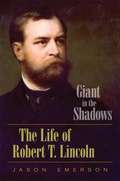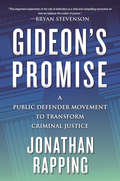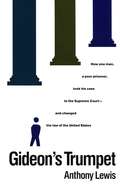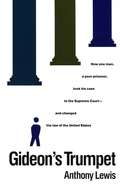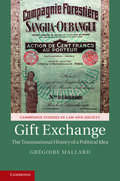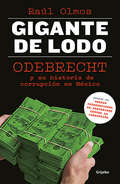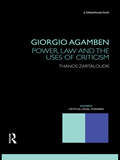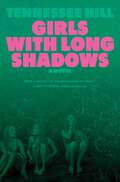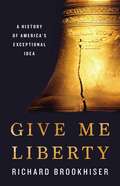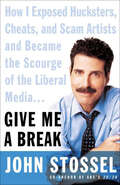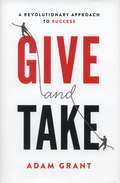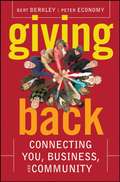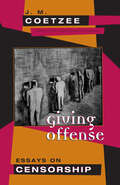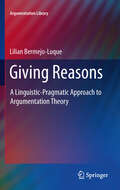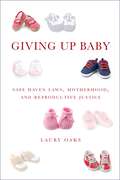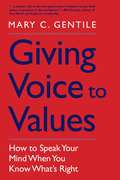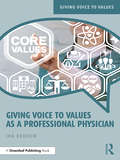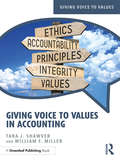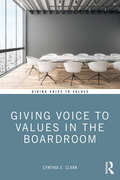- Table View
- List View
Giambattista Vico on Natural Law: Rhetoric, Religion and Sensus Communis
by John SchaefferThis book introduces the thought of Giambattista Vico (1668-1744) into the discussion about natural law. For many critics, natural law is not natural but a façade behind which lurks the supernatural – that is, revealed religion. While current notions of natural law are based on either Aristotelian/Thomistic principles or on Enlightenment rationalism, the book shows how Vico was the only natural law thinker to draw on the Roman legal tradition, rather than on Greek or Enlightenment philosophy. Specifically, the book addresses how Vico, drawing his inspiration from Roman history, incorporated both rhetoric and religion into a dynamic concept of natural law grounded in what he called the sensus communis: the entire repertoire of values, images, institutions, and even prejudices that a community takes for granted. Vico denied that natural law could ever furnish a definitive answer to moral problems in the social/public sphere. Rather he maintained that such problems had to be debated in the wider arena of the sensus communis. For Vico, as this book argues, natural law principles emerged from these debates; they did not resolve them.
Giant in the Shadows: The Life of Robert T. Lincoln
by Jason EmersonAlthough he was Abraham and Mary Lincoln’s oldest and last surviving son, the details of Robert T. Lincoln’s life are misunderstood by some and unknown to many others. Nearly half a century after the last biography about Abraham Lincoln’s son was published, historian and author Jason Emerson illuminates the life of this remarkable man and his achievements in Giant in the Shadows: The Life of Robert T. Lincoln. Emerson, after nearly ten years of research, draws upon previously unavailable materials to offer the first truly definitive biography of the famous lawyer, businessman, and statesman who, much more than merely the son of America’s most famous president, made his own indelible mark on one of the most progressive and dynamic eras in United States history. Born in a boardinghouse but passing his last days at ease on a lavish country estate, Robert Lincoln played many roles during his lifetime. As a president’s son, a Union soldier, an ambassador to Great Britain, and a U.S. secretary of war, Lincoln was indisputably a titan of his age. Much like his father, he became one of the nation’s most respected and influential men, building a successful law practice in the city of Chicago, serving shrewdly as president of the Pullman Car Company, and at one time even being considered as a candidate for the U.S. presidency. Along the way he bore witness to some of the most dramatic moments in America’s history, including Robert E. Lee’s surrender at Appomattox Courthouse; the advent of the railroad, telephone, electrical, and automobile industries; the circumstances surrounding the assassinations of three presidents of the United States; and the momentous presidential election of 1912. Giant in the Shadows also reveals Robert T. Lincoln’s complex relationships with his famous parents and includes previously unpublished insights into their personalities. Emerson reveals new details about Robert’s role as his father’s confidant during the brutal years of the Civil War and his reaction to his father’s murder; his prosecution of the thieves who attempted to steal his father’s body in 1876 and the extraordinary measures he took to ensure it would never happen again; as well as details about the painful decision to have his mother committed to a mental facility. In addition Emerson explores the relationship between Robert and his children, and exposes the actual story of his stewardship of the Lincoln legacy—including what he and his wife really destroyed and what was preserved. Emerson also delves into the true reason Robert is not buried in the Lincoln tomb in Springfield but instead was interred at Arlington National Cemetery. Meticulously researched, full of never-before-seen photographs and new insight into historical events, Giant in the Shadows is the missing chapter of the Lincoln family story. Emerson’s riveting work is more than simply a biography; it is a tale of American achievement in the Gilded Age and the endurance of the Lincoln legacy.
Gibt es ein Recht auf Gemeinwohl?: Öffentliche Interessen im Blickwinkel von Rechts- und Politikwissenschaft (essentials)
by Christoph StrünckPolitikwissenschaftliche Pluralismustheorien betrachten Gemeinwohl als Resultat politischer Kompromisse. Solche prozeduralen Konzepte finden sich auch in der Rechtswissenschaft, wenn es darum geht, allgemeinen und schwachen Interessengruppen besondere Klagerechte einzuräumen. Allerdings müssen Gerichte in ihren Urteilen inhaltlich begründen, inwiefern mit solchen Klagen öffentliche Interessen gewahrt werden. Am Beispiel des Verbraucherschutzes erläutert der Autor, warum moderne Pluralismuskonzepte auch solche inhaltlichen Gemeinwohlbestimmungen in die Analyse der Interessenvermittlung einbeziehen sollten.
Gideon's Promise: A Public Defender Movement to Transform Criminal Justice
by Jonathan RappingA blueprint for criminal justice reform that puts a new generation of public defenders front and center in the fight for legal equalityCombining wisdom drawn from over a dozen years as a public defender and cutting-edge research in the fields of organizational and cultural psychology, Jonathan Rapping reveals the pervasive issues inherent in our current system of public defense, and lays the foundation for how model public defense programs should work to end mass incarceration. Public defenders represent over eighty percent of those who interact with the court system, a disproportionate number of whom are poor, non-white citizens who rely on them to navigate the law on their behalf. More often than not, even the most well-meaning of those defenders are over-worked, under-funded, and incentivized to put the interests of judges and politicians above those of their clients in a culture that beats the passion out of talented, driven advocates, and has led to an embarrassingly low standard of justice for those who depend on the promises of Gideon v. Wainwright.However, rather than arguing for a change in rules that govern the actions of lawyers, judges, and other advocates, Rapping proposes a radical cultural shift to a "fiercely client-based ethos" driven by values-based recruitment and training, awakening defenders to their role in upholding an unjust status quo, and a renewed pride in the essential role of moral lawyering in a democratic society.Through the story of founding Gideon's Promise and anecdotes of his time as a defender and teacher, Rapping reanimates the possibility of public defenders serving as a radical bulwark against government oppression and a megaphone to amplify the voices of those they serve.
Gideon's Trumpet
by Anthony LewisA history of the landmark case of James Earl Gideon's fight for the right to legal counsel. Notes, table of cases, index. The classic backlist bestseller. More than 800,000 sold since its first pub date of 1964.From the Trade Paperback edition.
Gideon's Trumpet
by Anthony R. LewisRecounts the true story of a prisoner who went to the supreme court in order to insure his right to legal representation.
Gift Exchange: The Transnational History of a Political Idea (Cambridge Studies in Law and Society)
by Grégoire MallardSince Marcel Mauss published his foundational essay The Gift in 1925, many anthropologists and specialists of international relations have seen in the exchange of gifts, debts, loans, concessions or reparations the sources of international solidarity and international law. Still, Mauss's reflections were deeply tied to the context of interwar Europe and the French colonial expansion. Their normative dimension has been profoundly questioned after the age of decolonization. A century after Mauss, we may ask: what is the relevance of his ideas on gift exchanges and international solidarity? By tracing how Mauss's theoretical and normative ideas inspired prominent thinkers and government officials in France and Algeria, from Pierre Bourdieu to Mohammed Bedjaoui, Grégoire Mallard adds a building block to our comprehension of the role that anthropology, international law, and economics have played in shaping international economic governance from the age of European colonization to the latest European debt crisis. This title is also available as Open Access on Cambridge Core.
Gigante de lodo: Odebrecht y su historia de corrupción en México
by Raúl OlmosElecciones compradas, sobornos, lavado de dinero y un paraíso de impunidad en México. En la víspera de que Enrique Peña Nieto asumiera la Presidencia de la República, el departamento de sobornos de la trasnacional brasileña Odebrecht transfirió casi un millón de dólares a una cuenta ligada a uno de los hombres más cercanos al entonces mandatario electo. Y justo un día después de una cita entre Peña Nieto y Marcelo Odebrecht, presidente del emporio, se realizó una de las transferencias ilícitas. ¿Aquello fue una simple coincidencia o una acción concertada? Este libro muestra la sincronía casi perfecta entre los sobornos -en total, más de 16 millones de dólares desde 2009- y la entrega de contratos multimillonarios a Odebrecht en México. Contra lo que muchos creen, el poder corruptor del consorcio brasileño no se restringió a Petróleos Mexicanos o al gobierno federal. Políticos de primer nivel de otros partidos también estuvieron en contacto con el brazo corruptor de esa trasnacional. Gigante de lodo, en suma, es el libro clave para entender a profundidad la mayor trama de corrupción en la historia del continente, que en México permanece prácticamente impune.
Gilbert Pocket Size Law Dictionary
by Publisher'S Editorial StaffThe entries in the Gilbert Law Dictionary encompass the most common words and definitions in the legal vocabulary. The Dictionary is designed as a portable reference guide, abridged for convenience and facility. With this book in hand, you should soon come to understand the language of law.
Giorgio Agamben: Legal, Political and Philosophical Perspectives
by Tom FrostThis book collects new contributions from an international group of leading scholars – including many who have worked closely with Agamben – to consider the impact of Agamben’s thought on research in the humanities and social sciences. Giorgio Agamben: Legal, Political and Philosophical Perspectives addresses the potential of Agamben’s thought by re-focusing attention away from his critiques of Western politics and towards his scheme for a political future. Part I of the book draws upon a wide range of issues such as legal oaths, legal reasoning and Christian conceptions of love in order to examine the potential for Agamben’s work to impact upon future legal scholarship. Part II focuses on political perspectives that include references to Marx, Rousseau and Agamben’s conception of the ‘messianic’. Theology, biology, and the thought of Gilles Deleuze, Walter Benjamin and Antonin Artaud are all drawn upon in Part III to explore philosophical perspectives in Agamben’s thought. This book demonstrates the importance and originality of Giorgio Agamben, who has articulated a vision of politics that must be recognised as an influential contribution to modern philosophical and political thinking. It is a book that will be of considerable interest to many working across the humanities and social sciences.
Giorgio Agamben: Power, Law and the Uses of Criticism (Nomikoi: Critical Legal Thinkers)
by Thanos ZartaloudisGiorgio Agamben: Power, Law and the Uses of Criticism is a thorough engagement with the thought of the influential Italian philosopher Giorgio Agamben. It explores Agamben’s work on language, ontology, power, law and criticism from the 1970s to his most recent publications. Introducing Agamben's work to a readership in legal theory, as well as in the humanities and social sciences more generally, Thanos Zartaloudis argues that an adequate understanding of Agamben's Homo Sacer project requires an attention to his earlier philosophical writings on language, ontology, power and time. It is through this attentive and creative analysis of Agamben's work that Zartaloudis here presents a rethinking of the ideas of justice and criticism.
Girls on the Stand: How Courts Fail Pregnant Minors
by Helena SilversteinChoice Outstanding Academic Title for 2008The U.S. Supreme Court has decided that states may require parental involvement in the abortion decisions of pregnant minors as long as minors have the opportunity to petition for a &#“bypass” of parental involvement. To date, virtually all of the 34 states that mandate parental involvement have put judges in charge of the bypass process. Individual judges are thereby responsible for deciding whether or not the minor has a legitimate basis to seek an abortion absent parental participation. In this revealing and disturbing book, Helena Silverstein presents a detailed picture of how the bypass process actually functions.Silverstein led a team of researchers who surveyed more than 200 courts designated to handle bypass cases in three states. Her research shows indisputably that laws are being routinely ignored and, when enforced, interpreted by judges in widely divergent ways. In fact, she finds audacious acts of judicial discretion, in which judges structure bypass proceedings in a shameless and calculated effort to communicate their religious and political views and to persuade minors to carry their pregnancies to term. Her investigations uncover judicial mandates that minors receive pro-life counseling from evangelical Christian ministries, as well as the practice of appointing attorneys to represent the interests of unborn children at bypass hearings.Girls on the Stand convincingly demonstrates that safeguards promised by parental involvement laws do not exist in practice and that a legal process designed to help young women make informed decisions instead victimizes them. In making this case, the book casts doubt not only on the structure of parental involvement mandates but also on the naïve faith in law that sustains them. It consciously contributes to a growing body of books aimed at debunking the popular myth that, in the land of the free, there is equal justice for all.
Girls with Long Shadows: A Novel
by Tennessee Hill"A brilliant, engrossing portrait of three sisters and the bonds of love and betrayal. . . . Hill is a gifted talent and I look forward to more."—Jill McCorkle, New York Times bestselling author of Life After Life"Singular, striking, and sly, Girls with Long Shadows seduced me from its first sentence to its last. This book has so much scathing beauty in it I could feel the scrape of a knife on every page. What a delicate, hot-blooded tempest of a debut."—Amy Jo Burns, author of MercuryWith the haunting, romantic voyeurism of The Virgin Suicides and the atmosphere and emotional intensity of Where the Crawdads Sing, an intoxicating Southern Gothic debut novel about identical triplets whose lives are devastated when their burgeoning desires turn deadly.Identical triplets Baby A, Baby B, and Baby C Binderup were welcomed into the world as their mother was ushered out of it, leaving them nameless and in the care of their Gram, Isadora. Nineteen years later, the triplets work at their Gram’s crumbling golf course in Longshadow, Texas, where the ever-watchful eyes of the town observe them serving up glasses of ice-cold lemonade to golfers, swimming in the murky waters of the neighboring bayou, or slipping t-shirts off their sunburnt shoulders in hopes of attracting the kind of attention they are only beginning to understand.Cautious Baby B watches as lustful Baby A and introverted Baby C find matches among the town boys. Even Baby B has noticed that the town’s golden boy seems to be intrigued by her, only her. Just as each girl’s desire to be seen for herself is becoming fulfilled, a seemingly trivial kiss is bestowed on the wrong sister, leading to a moment of unspeakable violence that will upend the triplets’ world forever.Pulsating with menace and narrated with hypnotic lyricism, Girls with Long Shadows is an electrifying literary thriller that captures how female teenage angst can turn lethal when insecurities are weaponized and sibling bonds are severed. Tense, lush, and painfully beautiful, it forces us to consider the lengths to which we will go to claim our own personhood.
Give Me Liberty: A History of America's Exceptional Idea
by Richard BrookhiserAn award-winning historian recounts the history of American liberty through the stories of thirteen essential documentsNationalism is inevitable: It supplies feelings of belonging, identity, and recognition. It binds us to our neighbors and tells us who we are. But increasingly -- from the United States to India, from Russia to Burma -- nationalism is being invoked for unworthy ends: to disdain minorities or to support despots. As a result, nationalism has become to many a dirty word.In Give Me Liberty, award-winning historian and biographer Richard Brookhiser offers up a truer and more inspiring story of American nationalism as it has evolved over four hundred years. He examines America's history through thirteen documents that made the United States a new country in a new world: a free country. We are what we are because of them; we stay true to what we are by staying true to them.Americans have always sought liberty, asked for it, fought for it; every victory has been the fulfillment of old hopes and promises. This is our nationalism, and we should be proud of it.
Give Me a Break: How I Exposed Hucksters, Cheats, and Scam Artists and Became the Scourge of the Liberal Media...
by John Stossel“Immensely thought-provoking,”* Emmy Award–winning TV presenter John Stossel’s Give Me a Break exposes the hypocrisy and corruption of the U.S. government.Working as a correspondent for 20/20 and Good Morning America, John Stossel confronted dozens of scam artists: from hacks who worked out of their basements to some of America’s most powerful executives and leading politicians. His efforts shut down countless crooks—both famous and obscure. Then he realized what the real problem was.In Give Me a Break, Stossel takes on the regulators, lawyers, and politicians who thrive on our hysteria about risk and deceive the public in the name of safety. Drawing on his vast professional experience (as well as some personal ones), Stossel presents an engaging, witty, and thought-provoking argument about the beneficial powers of the free market and free speech.“Powerful, well-argued.” —*Booklist
Give and Take: A Revolutionary Approach to Success
by Adam M. GrantAn innovative, groundbreaking book that will captivate readers of Malcolm Gladwell, Daniel Pink, The Power of Habit, and Quiet. For generations, we have focused on the individual drivers of success: passion, hard work, talent, and luck. But today, success is increasingly dependent on how we interact with others. It turns out that at work, most people operate as either takers, matchers, or givers. Whereas takers strive to get as much as possible from others and matchers aim to trade evenly, givers are the rare breed of people who contribute to others without expecting anything in return. Using his own pioneering research as Wharton's youngest tenured professor, Grant that shows these styles have a surprising impact on success. Although some givers get exploited and burn out, the rest achieve extraordinary results across a wide range of industries. Combining cutting-edge evidence with captivating stories, this landmark book shows how one of America's best networkers developed his connections, why the creative genius behind one of the most popular shows in television history toiled for years in anonymity, how a basketball executive responsible for multiple draft busts transformed his franchise into a winner, and how we could have anticipated Enron's demise four years before the company collapsed--without ever looking at a single number. Praised by bestselling authors such as Dan Pink, Tony Hsieh, Dan Ariely, Susan Cain, Dan Gilbert, Gretchen Rubin, Bob Sutton, David Allen, Robert Cialdini, and Seth Godin--as well as senior leaders from Google, McKinsey, Merck, Estée Lauder, Nike, and NASA-- Give and Take highlights what effective networking, collaboration, influence, negotiation, and leadership skills have in common. This landmark book opens up an approach to success that has the power to transform not just individuals and groups, but entire organizations and communities.
Giving Back: Connecting You, Business, and Community
by Bert Berkeley Peter EconomyThere is something exciting happening in businesses across the country. More business-people and more companies than ever are participating in charitable activities and are learning that giving back is not a slogan--it is a way of doing business and a way of life. Giving Back reveals how fundamental and lasting changes are being accomplished in communities and highlights highly effective organizations from a number of major metropolitan areas, including Kiva.org, Horizons for Homeless Children, the Annie E. Casey Foundation, LINC, Stonyfield Farm Profits for the Planet, and many more. -amazon.com
Giving It All Away: The Story of William W. Cook and His Michigan Law Quadrangle
by Margaret A. Leary"Margaret Leary's carefully researched book illuminates a complex man who marked his university in a truly enduring way. " ---Francis X. Blouin Jr. , Director, Bentley Historical Library, and Professor, School of Information and Department of History, University of Michigan "Generations of Michigan Law grads have passed on myths about their generous but eccentric benefactor. . . . Now Margaret Leary has given us the real story, and it reads like a gripping whodunit. " ---Theodore J. St. Antoine, James E. and Sarah A. Degan Professor Emeritus of Law and Past Dean, University of Michigan Law School "In an absorbing book, Margaret Leary unstintingly investigates unpublished, archival material to unravel enigmas surrounding William Wilson Cook. She brings to life Cook's brilliant interactions with powerful moguls of the early twentieth century as she traces his lofty, philanthropic mission to elevate the legal profession. " ---Ilene H. Forsyth, Arthur F. Thurnau Professor of the History of Art, emerita, University of Michigan William W. Cook, born in 1858 and a graduate of the University of Michigan and of its law school, made his fortune by investing in the burgeoning telegraph and communications industry, as well as in representing the Mackay Company in their frequent tumultuous battles with Western Union and the U. S. government. Though Cook entered New York society and never returned to Michigan after receiving his law degree, he decided not just to give his alma mater the finest physical facility of any existing law school, but to donate permanent resources that would permit the law school to engage in groundbreaking legal research. However, his generosity proved controversial and eventually very litigious. Margaret A. Leary places Cook's story in the rich social and cultural context of his time and paints a fascinating portrait of a complex figure whose legacy continues to shape the University of Michigan. Cover photographs: (left) Gregory Fox Photography; (right) Ann B. Cook collection, photo by Russell R. Serbay
Giving Offense: Essays on Censorship
by J. M. CoetzeeJ.M. Coetzee presents a coherent, unorthodox analysis of censorship from the perspective of one who has lived and worked under its shadow. The essays collected here attempt to understand the passion that plays itself out in acts of silencing and censoring. He argues that a destructive dynamic of belligerence and escalation tends to overtake the rivals in any field ruled by censorship.
Giving Reasons
by Lilian Bermejo LuqueThis book provides a new, linguistic approach to Argumentation Theory. Its main goal is to integrate the logical, dialectical and rhetorical dimensions of argumentation in a model providing a unitary treatment of its justificatory and persuasive powers. This model takes as its basis Speech Acts Theory in order to characterize argumentation as a second-order speech act complex. The result is a systematic and comprehensive theory of the interpretation, analysis and evaluation of arguments. This theory sheds light on the many faces of argumentative communication: verbal and non-verbal, monological and dialogical, literal and non-literal, ordinary and specialized. The book takes into consideration the major current comprehensive accounts of good argumentation (Perelman's New Rhetoric, Pragma-dialectics, the ARG model, the Epistemic Approach) and shows that these accounts have fundamental weaknesses rooted in their instrumentalist conception of argumentation as an activity oriented to a goal external to itself. Furthermore, the author addresses some challenging meta-theoretical questions such as the justification problem for Argumentation Theory models and the relationship between reasoning and arguing.
Giving Up Baby: Safe Haven Laws, Motherhood, and Reproductive Justice
by Laury Oaks“Baby safe haven” laws, which allow a parent to relinquish a newborn baby legally and anonymously at a specified institutional location—such as a hospital or fire station—were established in every state between 1999 and 2009. Promoted during a time of heated public debate over policies on abortion, sex education, teen pregnancy, adoption, welfare, immigrant reproduction, and child abuse, safe haven laws were passed by the majority of states with little contest. These laws were thought to offer a solution to the consequences of unwanted pregnancies: mothers would no longer be burdened with children they could not care for, and newborn babies would no longer be abandoned in dumpsters.Yet while these laws are well meaning, they ignore the real problem: some women lack key social and economic supports that mothers need to raise children. Safe haven laws do little to help disadvantaged women. Instead,advocates of safe haven laws target teenagers, women of color, and poor women with safe haven information and see relinquishing custody of their newborns as an act of maternal love. Disadvantaged women are preemptively judged as “bad” mothers whose babies would be better off without them.Laury Oaks argues that the labeling of certain kinds of women as potential “bad” mothers who should consider anonymously giving up their newborns for adoption into a “loving” home should best be understood as an issue of reproductive justice. Safe haven discourses promote narrow images of who deserves to be a mother and reflect restrictive views on how we should treat women experiencing unwanted pregnancy.
Giving Voice to Values
by Mary C. GentileThis small volume presents directly applicable ideas and tasks that teach the reader how to feel empowered to speak up and persist in speaking up for what's right in the work place. Gentile (Babson College, Wellesley, Mass.) fashions the principles behind the concepts into a clear set of skills for action, with the belief that most people know the difference between right and wrong but are hindered for many reasons in speaking up in the workplace. Ethics, psychology, and philosophy are part of the text's content, but the main focus is on values and action, how to overcome fear of conflict, understand the motivation of others, look ahead to see risk, communicate with others, and generally feel empowered to act for what's right in the workplace. An appendix contains extensive study aids for the reader and materials for peer-coaching. Annotation ©2010 Book News, Inc. , Portland, OR (booknews.com)
Giving Voice to Values as a Professional Physician: An Introduction to Medical Ethics (Giving Voice to Values)
by Ira BedzowGiving Voice to Values as a Professional Physician provides students with the theoretical background and practical applications for acting on their values in situations of ethical conflict. It is the first medical ethics book that utilizes the Giving Voice to Values methodology to instruct students in medical ethics and professionalism. In doing so, it shifts the focus of ethics education from intellectually examining ethical theories and conflicts to emphasizing moral action. Each section of the book explains how moral decision-making and action can be implemented in the healthcare arena. Medical ethics cases are provided throughout in order to assist students in giving voice to their values and developing skills for professional action. The Giving Voice to Values methodology, and the cases in this book, do not focus on the big questions of academic ethics, but rather on the ethics of the everyday, even if the challenges presented are difficult. In other words, the ethical questions students will have to face, in this book and in medical education and practice, are about how to interact with others, whether they be patients or colleagues, who might have different ethical positions. The book provides a unique guide for professional identity formation and the teaching of ethics in medical schools.
Giving Voice to Values in Accounting (Giving Voice to Values)
by Tara J. Shawver William F. MillerThere has been much written on the importance of responsibility accounting and integrated reporting to ensure business accountability, but not on how to be a responsible accountant. As the accounting profession is built on the foundation of maintaining public trust, making the right decisions when faced with a challenging dilemma has a major impact on the long-term performance and perception of the firm as well as personal credibility. Accountants make judgement calls on a regular basis: they are privy to highly confidential information regarding their clients and their clients' businesses. Unethical earnings management practices can easily lead to falsifying records, but how does the accounting professional avoid succumbing to these practices when faced with other pressures? Giving Voice to Values in Accounting is the first book to explain the ethical dilemmas faced by accountants in their day-to-day work and to provide clear guidance for accounting students and professionals in navigating through these issues. The Giving Voice to Values (GVV) framework focuses on resolving ethical conflict by encouraging individuals to act on their values. This book provides accounting educators, coaches, trainers and professionals with both the impetus and the tools to easily implement the GVV offering into their own work, their organizations and in the classroom.
Giving Voice to Values in the Boardroom (Giving Voice to Values)
by Cynthia E. ClarkThis book takes the central issues facing board members today and applies the giving voice to values framework while also providing insights from practicing board members who have faced these issues. It covers such topics as strategic planning and monitoring, director independence, privacy and cyber risk, executive compensation and CEO succession planning. With this book, readers will also grapple with the conflicts of interest that might arise in the director selection process, role of the nominating committee and the compensation committee in order to cultivate more optimal board dynamics. The principles of giving voice to values start by asking a deceptively simple question: ‘What if you were going to act on your values—what would you say and do?’ The book then provides an overview of the current landscape of corporate governance along with the major rules and director duties applicable to the board of directors. The book’s latter chapters contain a series of five scenarios common to the board of directors that are presented as a set of “Board Challenges” involving the tensions often found in board work. In Giving Voice to Values in the Boardroom, the author, Cynthia E. Clark, provides practical strategies for board members and other constituents of corporate governance to deal with these challenges. These cases are designed to help users of the book implement prescripting and action planning. Each case will also have discussion questions about the stakes and stakeholders, common reasons and rationalizations and examples of how firms and governance professionals have handled similar board challenges.

